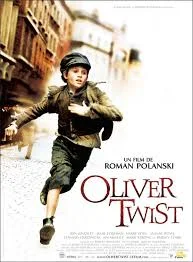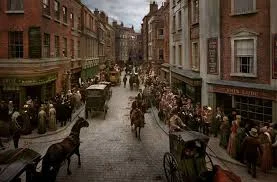“There are books of which the backs and covers are by far the best parts.”
We all know that feeling: we want to know about a certain story, but just can't be bothered to read the whole book. And then we ask ourselves: 'Can't I just watch the movie?'
This post is created to answer that question for you. I'll be reading classic novels and watching several adaptations to find out if you can watch the movie and why/why not. I have not included series in this post, because if you want to spend 12 hours watching an adaptation, you might as well read the book (especially since Oliver Twist is a way faster read). Also, hello high school/ college kids who will no doubt end up on this post to avoid school work. I hope I can help.
Oliver Twist (1948)
Can't I just watch this movie?
Yes, you absolutely can.
I was very weary about this film. A big part of Oliver Twist's story has to do with Fagin, who is also called "The Jew" and is portrayed pretty anti-semetic. With the release of this movie so close after World War II, I wondered how true they could stay to the story without offending everyone.
Though it turns out that they did pretty much offend everyone, I actually think this adaptation is the best one created. The moment the film starts, which is shot completely in black and white, you get the feel of the Dickens novel: Victorian England is gross and a lot of people in it are awful.
“Mr. Brownlow: The law assumes that your wife acts under your direction.
Mr. Bumble: If the law supposes that, then the law is a ass, a idiot! If that’s the eye of the law, then the law is a bachelor. And the worst I wish the law is that his eye may be opened by experience.”
Especially when Oliver gets to London, you really see how disgusting the place was and how overwhelming this must have been for Oliver. If you want to see Dickensian London, this movie is perfect for it. Fagin, the reason for all the controversy, is also exactly like described in the book, but is never called "The Jew". Is this anti-semtic? Yes, because everyone knows he's actually a Jew and he displays all the negative Jewish stereotypes, but it does stay true to the original story.
However, Oliver Twist is a really long book and there were cuts that had to be made. Though the movie stays true to the story in spirit, there are certain characters cut out. While in the book, a major burglary takes place that connects Oliver to Rose Maylie and starts his stay there, this is removed from the movie. Rose Maylie is never mentioned, instead the focus is heightened on Bill Stiles - who is actually a well rounded character, just like in the book.
If you want to just watch the movie, you'd miss one big thing: first off, the reader never knows anything about Oliver's mother until the end, while the movie starts with it, and Oliver is not Mr. Brownlow's grandson and he's actually Monks' half-brother; a character that's in the movie, but never really mentioned. However, you do get a great sense of Dickens' world and the intricate plot, with the many complicated nuances between good and bad, he created in Oliver Twist.
Oliver! (1968)
Can't I just watch it?
Maybe
Whether or not you can just watch Oliver! depends on twi things. One is that you need to be able to watch endless songs and dance routines and two is that if you are getting tested about Oliver Twist in school, this one won't do.
But besides those points, this is actually a really good adaptation. Just like the 1948 one, Dickensian London is depicted in all its gore and the musical numbers are really opportunities to see more of the set and amazing clothing designs. The casting of characters was also really good, so you'll get a great feel about who is who and what they represent in the novel. (Especially Bill Sikes and his dog were amazing here; I doubt anyone wouldn't be scared of them)
Even though this movie is 2 and a half hours long, there have been major cuts in the plot. Once again, Rose Maylie and the burglary in her house is never mentioned - it's a different burglary at a irrelevant house. The events of the movie are also all shortened; we start later in Oliver's life and many events are merged (very successfully) together throughout the movie. So if you need to know specific plot details, this movie just won't cut it.
What I appreciated about this adaptation is that it's the only one out of the three that really highlights the complexity of Nancy; the only character who actually struggles with being good or bad. Again, some liberties have been taken here compared to the original plot, but I found them all in the spirit of the original story.
What Oliver! does is transform the story to modern times; it is more comical than any other adaptation, but we shouldn't forget that Charles Dickens was a funny writer. We might not appreciate all of his jokes in this time, but the movie translates them well. The only thing they really changed is the ending, which is suddenly a happy ending for all (besides Nancy and Bill), which is quite different from the book.
So this adaptation is highly enjoyable and gives you a great sense of how contemporary readers would have experienced the story and characters, but it does leave out major plot points and simplifies the story in many different ways.
Oliver Twist (2005)
Can't I just watch this movie?
Probably not.
Though Roman Polanski's version of Oliver Twist is a very enjoyable watch, it does not really accurately represent the book in all its complicated nuances.
In short, 2005's Oliver Twist is the Disney version of the story. You get a sense of what the story is about, but you miss most of the nuances and dirty scenes that are included in the book. It's a great way to get familiar with the story so you can speed read the book and especially the first part of the movie (until Oliver gets taken in by Mr. Brownlow) is particularly accurate and interesting.
The main thing you miss out on is how incredibly disgusting Oliver Twist's London was. Yes, there are rats, but it's light, it's never too crowded to see our characters and even the dirty house of Fagin has its charm. Dicken's London on the other hand is thoroughly disgusting and dark - nothing like this movie version. Also, the characters are way too clean and pretty. Fagin isn't disgusting at all and Bill Sikes' dog, the dog everyone in London is scared of, looks more like a cute puppy than a killer.
Connected to that point, is the fact that there are big chunks of story line missing to make the movie more Hollywood. Does it make the story easier to follow? Yes. Does it mean you'll miss out on the complexity of Dickens? Also yes. The whole family of Rose Maylie is cut out and there's no discussion about Oliver's parents at all. In this movie, Oliver ends up well because he's a good boy - in the book he ends up well because he was born to rich parents and rich people always end up well. While all the other adaptations also cut out plot points, here I just found there was too much missing for it to stay true to the novel. If you really want to understand why Dickens was such a master of plotting, this movie just won't cut it.










